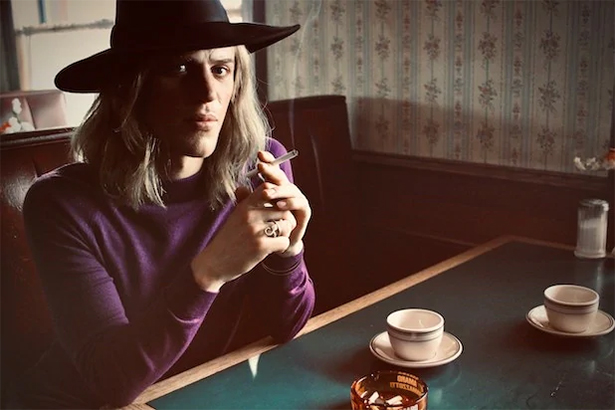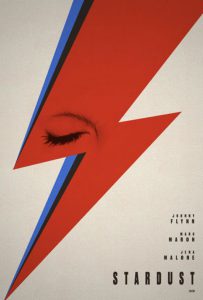By Simone Goldstone | Soundcheck Columnist
“Stardust,” a conventional dramatized biopic on one of the world’s most unconventional rock stars, brings pre-Ziggy Bowie to life through his tumultuous publicity road trip through America.
While at times a little over ambitious on subject matter, the film showcases Johnny Flynn’s fantastic portrayal of such a chameleonic and complexly brilliant character.
For anyone looking to dive deeper into the multi-faceted, mythologized world of Bowie, “Stardust” depicts the factual inner turmoil and musical struggle Bowie faced early on in his career through fictionalized scenes and flashbacks.
The film takes place a few years after Bowie’s success of “Space Oddity” and details the in-between time after his first hit but before the success of “Ziggy Stardust.” The film takes a large look at Bowie’s personal life: his fear of inheriting the insanity that drove his elder half-brother, Terry, to kill himself on London’s train tracks, and his relationship, trials and triumphs with famed publicist Ron Oberman.
One of the things this film does superbly well is it’s memorable and iconic one-liners. While at times a little long, and darker than expected, the dialogue has a few catchy, shining moments.
Bowie is not allowed to sing in America, and instead must convince the audience of his genius through interviews. Discouraged by the legalities and learning his management hasn’t booked him a hotel or concert dates, Bowie is buoyed by Oberman.
“All it takes is one believer to change the world, and we got two,” he tells David. “Two?” “You believe in yourself don’t you? Because if you don’t, we’re really F****ed.”

Like many artists, Bowie has trouble getting the label to take him seriously and believe in his remaining potential. He is aware of his avant-garde greatness and has accepted that he’ll be looked back on as seminal in the coming generation.
However, his first wife, Angie raises the question to his manager: “What about the present?”
Being ahead of their time is a sacrifice some artists make to advance music, though Bowie is sure with the right marketing, the audiences will “get” him, although he doesn’t always get or understand himself. Pained by the possibility of losing his sanity, he uses humor and shock value to deter from the embarrassment of his brother’s hospitalization. This alienates American journalists and radio hosts, who dismiss him as an oversold British dandy and joke at his mime performances. Bowie’s love of mime and stage tricks were what captivated his later audiences, and the film uses his idiosyncrasies to paint a picture of the stripped-down David Jones (Bowie’s real name) before his stage make up glamour.
While the costumes and sets are wonderful, there are a few missed opportunities in the film itself. The buildup to a scene where Bowie is invited to a Warhol party could have been an exciting chance to bring another revered and iconic character to life. We see Bowie giving a mime performance at a screen test but never glimpse a cameo of Andy. After attending a Velvet Underground performance, Bowie talks excitedly to the frontman, only to be revealed he isn’t Lou Reed after all, but Doug Yule. This does spark another great line: “What’s the difference between a rock star and somebody impersonating a rock star?”
The film would have been perked up by the use of Bowie hits to brighten the disheartening atmosphere, aside from the snippets of Jacque Brel’s “My Death” and “Amsterdam.”
Remembering that Bowie does, in fact, succeed helps to get through cringe-inducing scenes of him botching interviews and opportunities.
Flynn does a remarkable job bringing Bowie to life before he finds his persona. A hard role to accomplish, as Flynn must navigate the different identities Bowie tries on while he grapples with dissolving David Jones—the caring brother gripped by the fear of madness.
He is the standout star in the movie, and his performance makes the film worthwhile. He shows Bowie becoming a more sympathetic character through his armor of arrogance cracking with lingering self-doubt and his ambivalent relationship with his beloved older brother, Terry.
It is certainly not a feel-good movie, but a perspective-changing homage to a celebrated legend.
“Stardust” is part of the 2020 Newport Beach Film Festival, which has gone virtual this year and runs through October 11. For information on viewing this film and other films in the festival, visit www.NewportBeachFilmFest.com.





